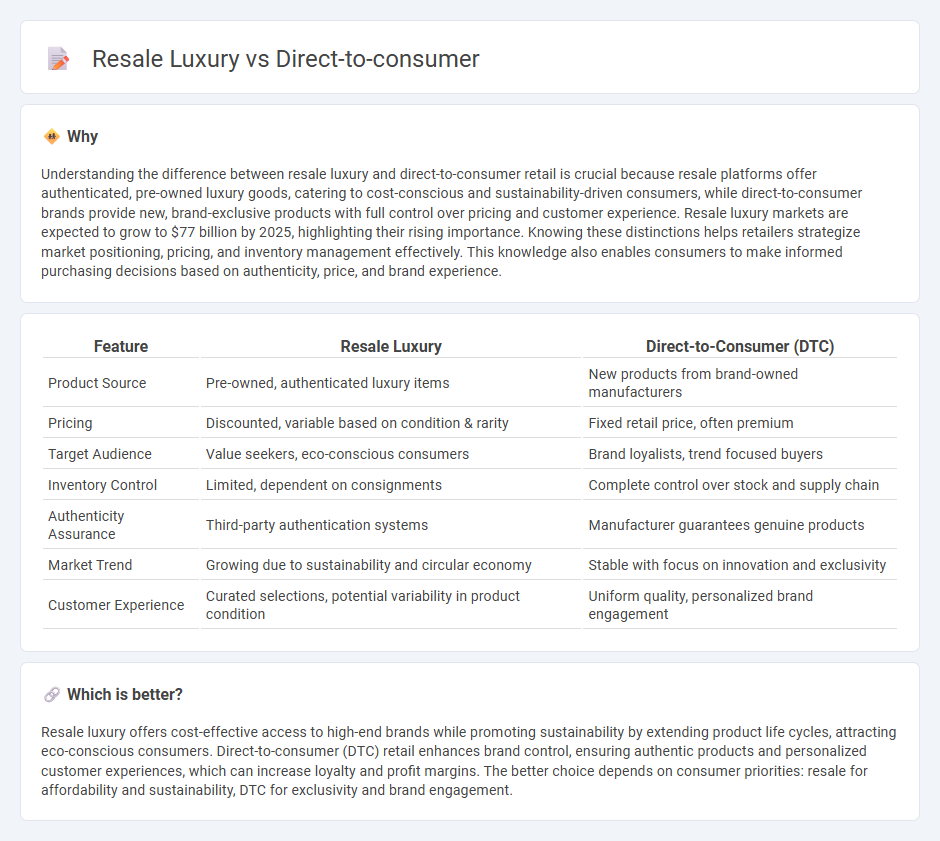
Resale luxury markets capitalize on the growing demand for authenticated pre-owned designer goods, offering consumers sustainable, cost-effective alternatives to traditional retail. Direct-to-consumer (DTC) brands eliminate intermediaries, delivering exclusive products with enhanced brand control and personalized customer experiences. Explore the evolving dynamics between resale luxury and DTC models to understand their impact on the future of retail.
Why it is important
Understanding the difference between resale luxury and direct-to-consumer retail is crucial because resale platforms offer authenticated, pre-owned luxury goods, catering to cost-conscious and sustainability-driven consumers, while direct-to-consumer brands provide new, brand-exclusive products with full control over pricing and customer experience. Resale luxury markets are expected to grow to $77 billion by 2025, highlighting their rising importance. Knowing these distinctions helps retailers strategize market positioning, pricing, and inventory management effectively. This knowledge also enables consumers to make informed purchasing decisions based on authenticity, price, and brand experience.
Comparison Table
| Feature | Resale Luxury | Direct-to-Consumer (DTC) |
|---|---|---|
| Product Source | Pre-owned, authenticated luxury items | New products from brand-owned manufacturers |
| Pricing | Discounted, variable based on condition & rarity | Fixed retail price, often premium |
| Target Audience | Value seekers, eco-conscious consumers | Brand loyalists, trend focused buyers |
| Inventory Control | Limited, dependent on consignments | Complete control over stock and supply chain |
| Authenticity Assurance | Third-party authentication systems | Manufacturer guarantees genuine products |
| Market Trend | Growing due to sustainability and circular economy | Stable with focus on innovation and exclusivity |
| Customer Experience | Curated selections, potential variability in product condition | Uniform quality, personalized brand engagement |
Which is better?
Resale luxury offers cost-effective access to high-end brands while promoting sustainability by extending product life cycles, attracting eco-conscious consumers. Direct-to-consumer (DTC) retail enhances brand control, ensuring authentic products and personalized customer experiences, which can increase loyalty and profit margins. The better choice depends on consumer priorities: resale for affordability and sustainability, DTC for exclusivity and brand engagement.
Connection
Resale luxury and direct-to-consumer (DTC) models intersect through their focus on authentic, high-quality products that cater to discerning consumers seeking exclusivity and value. Both channels leverage digital platforms to enhance customer engagement, streamline purchasing experiences, and build brand loyalty by emphasizing transparency and sustainability. The integration of resale luxury within DTC strategies reflects evolving consumer preferences toward circular fashion and personalized shopping journeys.
Key Terms
Brand Ownership
Direct-to-consumer luxury brands maintain full brand ownership and control over customer experience, pricing, and product authenticity, ensuring consistent brand perception. In contrast, resale luxury involves third-party platforms that may dilute brand control but offer access to a wider market and sustainability benefits. Explore how brand ownership shapes customer loyalty and market strategy in luxury retail.
Secondary Market
The secondary market in luxury goods thrives as consumers seek authenticated pre-owned items offering exclusivity and value preservation beyond direct-to-consumer channels. Platforms specializing in resale provide verified luxury products with transparent provenance, attracting buyers prioritizing sustainability and investment potential. Explore how the secondary market reshapes luxury consumption and enhances brand accessibility.
Authenticity Verification
Direct-to-consumer luxury brands often implement advanced authenticity verification technologies, such as blockchain and NFC tags, to ensure genuine products reach customers without intermediaries. Resale luxury markets rely heavily on expert authentication and AI-driven image analysis to verify pre-owned items, mitigating the risk of counterfeit goods. Discover more about how these verification techniques shape the future of luxury commerce.
Source and External Links
Direct-to-consumer - Wikipedia - Direct-to-consumer (DTC or D2C) is a business model where products are sold directly to customers, bypassing third-party retailers and wholesalers, primarily through online channels but sometimes also via physical stores.
Direct to Consumer Guide - Salesforce - D2C means manufacturers sell straight to end users, often through e-commerce websites, apps, or social commerce, while still maintaining relationships with traditional retailers in a complementary way.
What Is Direct-to-Consumer? - Shopify Blog - The DTC model lets brands control the entire sales process from marketing to fulfillment, enabling direct customer communication, tailored experiences, and access to real-time feedback.
 dowidth.com
dowidth.com